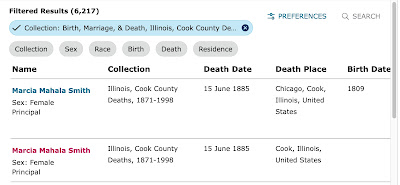 I recently received a request for help in finding a death certificate for William J. Quinn. It doesn't come up easily in search results at FamilySearch's Record Search even though it's there.
I recently received a request for help in finding a death certificate for William J. Quinn. It doesn't come up easily in search results at FamilySearch's Record Search even though it's there. QUINN, WILLIAM J 1892-01-21 CHICAGO 04 MO U 00014953 COOK
Here's how I found it:
I checked the Cook County Coroner's Inquest Index. If the name was there, William would have had a coroner's death certificate (different from the inquest) and I don't think those records are online. Searching "Quinn" and scanning for the death date, I didn't find a match.
Next I used Stephen Morse's One Step access to the Illinois Statewide Death Index to find "Q" deaths for January 1892. (The certificate numbers for Chicago death records before 1916 group the records together by first letter of surname within each month.)
I found a number of possibilities and so I chose the one that I though had the best chance of being indexed correctly: Charles Quinlin.
QUINLIN, CHARLES 1892-01-26 CHICAGO 11 MO U 00014952
QUEHL, INGER L 1892-01-16 CHICAGO 75 YR U 00014955
QIANI, CAROLINA 1892-01-08 CHICAGO 06 MO U 00014957
I searched Record Search for "Charles Quinlin" and narrowed the results to Cook County death certificates by clicking on the "Collection" link at the top of the page.
In this case, Charles' record came up easily and it happened to be one certificate away from the one I was looking for. I clicked to move one record forward and discovered that was #14951 and I was looking for #14953. I moved one record the other direction and located the record for William J. Quinn.
Looking at the record, I could see where an inexperienced indexer might read the surname as "Luinn" so I searched for that. No luck. So I tried Tuinn. No luck. So I searched William J. and found 151 close matches but no luck. So I tried Nilliam. And then I decided that it wasn't all that important for me to figure out how the record was indexed. My goal was to find the record and I did.
So, the short of it is this: if you don't find an early Chicago death record on Record Search, check the inquest index. If the name isn't there, locate the index entry in the Illinois Statewide Death Index. Then use Stephen Morse's One Step to find certificates beginning with the same surname letter for the same month and year. Search for nearby certificates, then once you're in the database, page through looking for the correct number.
If the name is on the coroner's inquest index or if you find a gap in numbers where the certificate should be, you are welcome to email me for help.




